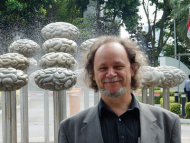Description:
Artificial Intelligence has a great influence on research in many branches of science. In 2023, about 8% of all scientific publications have used some form of AI. Most scientists expect that it will be essential in their field. AI tools may accelerate our research in many ways. However, in this panel, we would like to discuss how far it may lead us, how it can change radically the way we do science, create new hypotheses, facilitate deep reasoning, and what kind of discoveries it will enable. In the last year, we have seen interesting progress in mathematics, computer science, biomedical sciences, technology development, social sciences, and humanities. Currently, AI serves as a tool; machine learning is used for pattern recognition without real understanding. It can also serve as a research partner, generating interesting ideas. In the near future, in some branches of science, it can also reach the stage of creating models with complexity that will be beyond human comprehension.
Moderator: Włodzisław Duch

Biography:
Wlodzislaw Duch is the head of the Neurocognitive Laboratory in the Center of Modern Interdisciplinary Technologies, and the Neuroinformatics and Artificial Intelligence group in the University Centre of Excellence Dynamics, Mathematical Analysis and Artificial Intelligence at the Nicolaus Copernicus University, Toruń, Poland. PhD in theoretical physics/quantum chemistry (1980), postdoc at the Univ. of Southern California, Los Angeles (1980-82), D.Sc. in applied math (1987). President of the European Neural Networks Society executive committee (2006-2008-2011), Fellow of the International Neural Network Society (2013), and the Asia-Pacific Artificial Intelligence Association (2022), Expert of the European Union science programs, member of the high-level expert group of European Institute of Innovation & Technology (EIT). Worked in the School of Computer Engineering, Nanyang Technological University (2003-07, 2010-12 as the Nanyang Visiting Professor). Visiting professor at the University of Florida; Max-Planck-Institute, Munich, Germany, Kyushu Institute of Technology, Meiji and Rikkyo University in Japan, and several other institutions. He is/was on the editorial board of IEEE TNN, CPC, NIP-LR, Cognitive Neurodynamics, Journal of Mind and Behavior, and 16 other journals; published over 380 peer-reviewed scientific papers, has written or co-authored 6 books and co-edited 21 books, and published about 300 conference abstracts and popular articles on diverse subjects. In 2014-15 he served as a deputy minister for science and higher education in Poland. His DuchSoft company has made in 1990 the GhostMiner data mining software package, for many years marketed by Fujitsu.
Description:
The development of artificial intelligence raises concerns, especially if Artificial General Intelligence (e.g. defined by OpenAI as "highly autonomous systems that outperform humans at most economically valuable work") is achieved by the end of this decade. According to increasingly frequent opinions, such advanced systems could trigger a revolution much more violent than the harnessing of fire, the invention of writing, or the industrial revolution that began in the 18th century. How deeply, then, would it change the way individuals function? Would it increase our freedom and strengthen democracy, or quite the opposite? Would it deprive people of work, especially in professions that have hitherto required creativity and thinking? Would it disrupt the sense of self-worth and meaning of life for people who will be replaced by better AI systems? These are just some of the questions and issues concerning the social consequences of artificial intelligence development that we would like to discuss during the panel.
Moderator: Marcin Rotkiewicz
 Biography:
Biography:
Marcin Rotkiewicz is a graduate of journalism and philosophy at the University of Warsaw and a Knight Science Journalism Program fellow at the Massachusetts Institute of Technology. He specializes in popularizing knowledge about biotechnology, AI, primate evolution, and neuroscience. He is also interested in pseudoscientific and conspiracy theories. He has been nominated twice for the Grand Press Award in the categories of specialized journalism and publicism. He is the author of two interview books: "Mózg i błazen" ("The Brain and the Jester") with Prof. Jerzy Vetulani and "Homo nie całkiem sapiens" ("Homo Not Quite Sapiens") with Prof. Bogdan Wojciszke. He also wrote "W królestwie Monszatana. GMO, gluten i szczepionki" ("In the Kingdom of Monsatan: GMO, Gluten and Vaccines"), for which he received the Mądre Książki (Wise Books) portal editors' award. He is a journalist in the science department of the weekly POLITYKA.